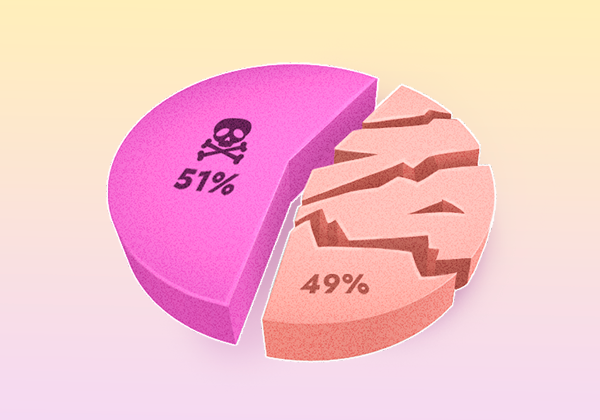
Cryptocurrencies and Stocks: What are the Differences?
Cryptocurrencies are digital assets that operate on cryptographically secure decentralized networks and are used for trading and savings. Stocks, on the other hand, are securities that represent ownership in a company. While shares and cryptocurrencies are different asset classes, they can both be traded and are considered investment instruments. Let's examine the key difference between crypto and stocks.
What is a Cryptocurrency?
Cryptocurrency is a digital currency that operates on a blockchain. It serves as a means of exchange or savings and employs cryptographic technology to ensure security and verify transactions. Most cryptocurrencies operate on decentralized networks, and their market value is determined by supply and demand, just like other assets.
What is a Stock?
Stocks represent partial ownership of a business and reflect the company's value. Shareholders may also receive a portion of the company's profits in the form of dividends. Share prices are influenced by the company's performance, as well as other factors such as media coverage.
The Difference Between Cryptocurrencies and Shares
Investors can use both stocks and crypto to increase their capital. However, there are significant differences between investing in crypto vs. stocks that you should be aware of.
Investing in cryptocurrencies does not provide ownership of project shares, unlike stocks. Crypto investors also do not receive dividends in the traditional way. Instead, they can earn passive income by sending their tokens to staking and liquidity pools or by using other crypto tools.
Stock markets are only open during specific hours on weekdays, while crypto exchanges operate 24/7. This is another key difference between stocks and crypto.
Pros and Cons of Investing in Crypto vs. Stocks
Investors often wonder whether they should invest in cryptocurrencies or stocks. To answer this question, we need to take a closer look at the advantages and disadvantages of each option.
Crypto's Advantages
Below are some of the advantages of investing in cryptocurrency:
Accessibility
Cryptocurrencies are available to anyone in the world with an internet connection.
Decentralization
Most cryptocurrencies operate on decentralized networks, making them less vulnerable to government regulation and censorship.
Inflation resistance
Cryptocurrencies are less susceptible to inflation as their value is not directly impacted by the monetary policies of central banks. However, it's important to consider the issuance and circulation of each individual crypto asset, as this may not hold true for all cryptocurrencies.
Flexibility
Compared to shares, crypto assets have more opportunities to boost profits. Staking and liquidity provision are all sources of income for crypto investors. Crypto users can actually enhance their cryptocurrency capital by using a wide range of special tools.
Diversity
Not all tokens' value is based solely on their price. For instance, fan tokens may offer owners exclusive advantages and benefits from companies or sports teams. Several cryptocurrencies function as management tokens, enabling their owners to direct the progress of a project or protocol.
Crypto's Disadvantages
Price volatility
Compared to stocks, cryptocurrencies are more volatile. On the one hand, this can be seen as a plus, as they have the potential to bring potentially higher profits even in the short term due to sharp price increases. On the other hand, the price of cryptocurrency can also sharply decrease, leading to significant losses. In the history of the cryptocurrency market, there have been many coins whose value has fallen tens or even hundreds of times compared to their highs.
Improper regulation
Not all tokens' value is based solely on their price. For instance, fan tokens may offer owners exclusive advantages and benefits from companies or sports teams. Several cryptocurrencies function as management tokens, enabling their owners to direct the progress of a project or protocol.
Storage risks
To access cryptocurrencies like Bitcoin, a private key must be kept in a digital crypto wallet. If you lose your Seed Phrase or physical crypto wallet, you will lose access to your cryptocurrency.
Lack of income guarantees
Trading cryptocurrencies doesn't provide income guarantees, much like other financial markets. Although Bitcoin and other cryptocurrencies have performed well over the long run, it's impossible to tell whether they will continue to grow or whether they will be just as beneficial when invested for a short time.
The Benefits of Stocks
Finally, let's explore the advantages and disadvantages of stocks to deal with the main question of what's better – crypto or stocks:
Growing accessibility
Nowadays, it's much simpler to purchase stocks thanks to the multiple new Internet platforms and investment tools available. Many of them have user-friendly interfaces and are integrated with other financial services.
Regulation
Stock markets are strictly governed by law in many nations. For instance, in the United States, publicly traded corporations are required to disclose information to the Securities and Exchange Commission (SEC), the state supervisory authority responsible for protecting investors, that could impact the value of their shares.
(Relational) resistance to inflation
Certain share classes can be used to protect capital from inflation.
Diversity
Small-scale investors have access to a broad selection of shares across a wide range of industries. Shares can be chosen by investors based on a variety of factors, including dividend payments, geography, and the business style of the company.
The Drawbacks of Stocks
Volatility
Some stocks can be more volatile than others. For instance, growth stock prices may fluctuate more than "Blue Chip" stock prices, which are those of reputable, well-known corporations.
Increased commissions
Compared to cryptocurrency trading, commissions for operations on the stock exchange are often significantly higher and more prevalent. Here, additional fees for the purchase or sale of shares are charged separately from brokerage commissions.
Lack of income guarantees
Like any financial market, stocks don't provide income assurance. Even while certain stocks outperform all other investment options over the long term, it's possible that they won't perform well in the near future.
► Sabai Academy — a place where studying blockchain, crypto, fractional ownership, and real estate investments becomes a catalyst for capital growth!
Sabai Academy
Join our FREE courses and get REWARDS IN CRYPTO!
Related Articles

Understanding the 51% Attack: Threats and Implications for Blockchain Infrastructure Protection

Features of Investing in Real Estate at the Construction Stage

